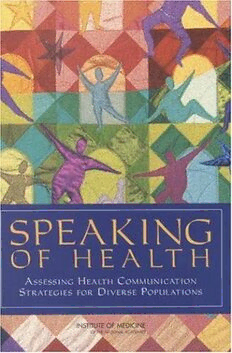
Speaking of Health: Assessing Health Communication Strategies for Diverse Populations PDF
377 Pages·2002·4.952 MB·English
Most books are stored in the elastic cloud where traffic is expensive. For this reason, we have a limit on daily download.
Preview Speaking of Health: Assessing Health Communication Strategies for Diverse Populations
Description:
We are what we eat. That old expression seems particularly poignant every time we have our blood drawn for a routine physical to check our cholesterol levels. And, it's not just what we eat that affects our health. Whole ranges of behaviors ultimately make a difference in how we feel and how we maintain our health. Lifestyle choices have enormous impact on our health and well being. But, how do we communicate the language of good health so that it is uniformly received-and accepted-by people from different cultures and backgrounds? Take, for example, the case of a 66 year old Latina. She has been told by her doctor that she should have a mammogram. But her sense of fatalism tells her that it is better not to know if anything is wrong. To know that something is wrong will cause her distress and this may well lead to even more health problems. Before she leaves her doctor's office she has decided not to have a mammogram-that is until her doctor points out that having a mammogram is a way to take care of herself so that she can continue to take care of her family. In this way, the decision to have a mammogram feels like a positive step. Public health communicators and health professionals face dilemmas like this every day. "Speaking of Health" looks at the challenges of delivering important messages to different audiences. Using case studies in the areas of diabetes, mammography, and mass communication campaigns, it examines the ways in which messages must be adapted to the unique informational needs of their audiences if they are to have any real impact. "Speaking of Health" looks at basic theories of communication and behavior change and focuses on where they apply and where they don't. By suggesting creative strategies and guidelines for speaking to diverse audiences now and in the future, the Institute of Medicine seeks to take health communication into the 21st century. In an age where we are inundated by multiple messages every day, this book will be a critical tool for all who are interested in communicating with diverse communities about health issues.
See more
The list of books you might like
Most books are stored in the elastic cloud where traffic is expensive. For this reason, we have a limit on daily download.
